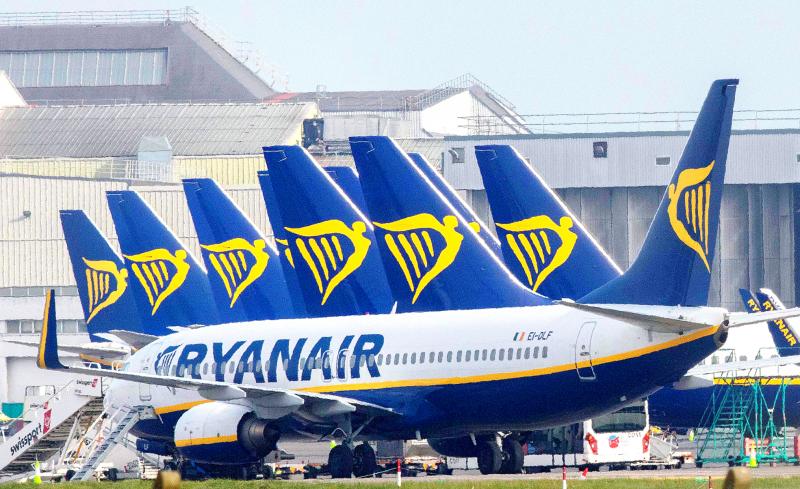Ryanair Holdings PLC is to institute temperature checks, require masks and prohibit lining up for toilets to reduce the chances of spreading COVID-19 when flights return on July 1.
Toilets are to be made available on request, Ryanair said yesterday in a statement.
The Irish low-cost carrier, which has grounded its fleet since late March, plans to restart with about 40 percent of its normal flight schedules, it said.

Photo: AFP
The comeback is dependent on government restrictions being lifted on flights within Europe. While the European Commission is preparing recommendations for removing border controls, there are signs that the reopening would be bumpy.
Within the EU, each nation sets its own rules on re-entry.
The UK, which just left the bloc, but remains a major hub for flights in the region, plans a 14-day quarantine on incoming travelers, which executives have decried as tantamount to a ban.
Ryanair chief executive officer Michael O’Leary has railed against state-aid plans and this week challenged a French bailout of Air France-KLM.
Ryanair said it would restart flights from most of its bases, and would offer seats starting from 20 euros (US$21.60) one-way.
Service would feature fewer checked bags, online check-ins and boarding passes downloadable to smartphones, it said.
The UK plan casts doubt on a reopening plan of numerous European airlines that had planned to restart travel in coming months.
The International Air Transport Association has called for a coordinated approach to reopening in Europe, while acknowledging the challenges given that different countries have different infection rates.
The EU recommendations, due today, are part of a “tourism package” of non-binding guidelines and the like covering everything from health measures to travel vouchers.
EU Commissioner for Competition Margrethe Vestager last week told lawmakers that digital contact tracing apps might “enable at least some traveling during the summer.”
Meanwhile, airlines have added more seats back to their flight schedules this week, led by China and even increases in Hong Kong, suggesting that the industry is starting to recover from the devastating impact of the pandemic, OAG Aviation Worldwide said.
Airlines globally added a net 600,000 seats to reach a total of almost 30 million, up about 2 percent from the previous week, OAG senior analyst John Grant wrote in a report.
That is still a long way off the weekly capacity of about 110 million seats this time last year, but it is an encouraging sign nonetheless.
Northeast Asia is a bright spot. China added 1 million seats to schedules this week, including 800,000 on domestic routes, and is now operating twice as many seats as the US.
Hong Kong’s Cathay Pacific Airways Ltd (國泰航空) added 40,000 seats and increased frequency by about 120 flights, Grant said.

Taiwanese suppliers to Taiwan Semiconductor Manufacturing Co. (TSMC, 台積電) are expected to follow the contract chipmaker’s step to invest in the US, but their relocation may be seven to eight years away, Minister of Economic Affairs J.W. Kuo (郭智輝) said yesterday. When asked by opposition Chinese Nationalist Party (KMT) Legislator Niu Hsu-ting (牛煦庭) in the legislature about growing concerns that TSMC’s huge investments in the US will prompt its suppliers to follow suit, Kuo said based on the chipmaker’s current limited production volume, it is unlikely to lead its supply chain to go there for now. “Unless TSMC completes its planned six

Intel Corp has named Tasha Chuang (莊蓓瑜) to lead Intel Taiwan in a bid to reinforce relations between the company and its Taiwanese partners. The appointment of Chuang as general manager for Intel Taiwan takes effect on Thursday, the firm said in a statement yesterday. Chuang is to lead her team in Taiwan to pursue product development and sales growth in an effort to reinforce the company’s ties with its partners and clients, Intel said. Chuang was previously in charge of managing Intel’s ties with leading Taiwanese PC brand Asustek Computer Inc (華碩), which included helping Asustek strengthen its global businesses, the company

Power supply and electronic components maker Delta Electronics Inc (台達電) yesterday said second-quarter revenue is expected to surpass the first quarter, which rose 30 percent year-on-year to NT$118.92 billion (US$3.71 billion). Revenue this quarter is likely to grow, as US clients have front-loaded orders ahead of US President Donald Trump’s planned tariffs on Taiwanese goods, Delta chairman Ping Cheng (鄭平) said at an earnings conference in Taipei, referring to the 90-day pause in tariff implementation Trump announced on April 9. While situations in the third and fourth quarters remain unclear, “We will not halt our long-term deployments and do not plan to

The New Taiwan dollar and Taiwanese stocks surged on signs that trade tensions between the world’s top two economies might start easing and as US tech earnings boosted the outlook of the nation’s semiconductor exports. The NT dollar strengthened as much as 3.8 percent versus the US dollar to 30.815, the biggest intraday gain since January 2011, closing at NT$31.064. The benchmark TAIEX jumped 2.73 percent to outperform the region’s equity gauges. Outlook for global trade improved after China said it is assessing possible trade talks with the US, providing a boost for the nation’s currency and shares. As the NT dollar